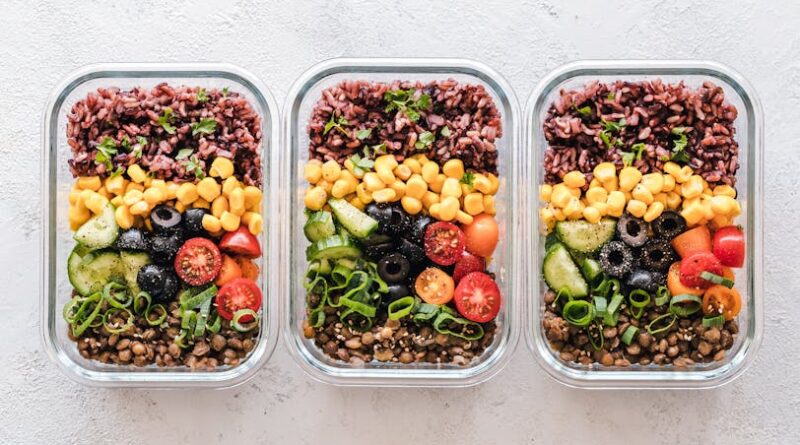Tips for Maintaining a Balanced Diet
Are you looking to lead a healthier lifestyle and improve your overall well-being? One of the key factors in achieving this goal is maintaining a balanced diet. However, with so much information available about what constitutes a healthy diet, it can be overwhelming to navigate the sea of advice. In this comprehensive guide, we will explore the essential tips for maintaining a balanced diet, backed by research, expert opinions, and real-life examples. By the end of this article, you will have a solid understanding of how to make informed choices about your nutrition and take steps towards a healthier you.
The Importance of a Balanced Diet

Before diving into the tips for maintaining a balanced diet, it’s crucial to understand why it is so important. A balanced diet provides the necessary nutrients, vitamins, and minerals that our bodies need to function optimally. It can help prevent chronic diseases, boost our immune system, improve our energy levels, and support overall health and well-being.
Tip 1: Eat a Variety of Foods

One of the essential tips for maintaining a balanced diet is to eat a variety of foods from all the food groups. This includes fruits, vegetables, whole grains, lean proteins, and healthy fats. Each food group provides different nutrients that our bodies need, so it’s important to include a diverse range of foods in your meals.
For example, fruits and vegetables are rich in vitamins, minerals, and antioxidants that help protect our bodies from diseases. Whole grains provide fiber, which is essential for digestive health and can help lower the risk of heart disease. Lean proteins like chicken, fish, tofu, and legumes are important for muscle growth and repair.
Tip 2: Watch Your Portion Sizes

Another crucial aspect of maintaining a balanced diet is paying attention to portion sizes. Even healthy foods can contribute to weight gain if consumed in large quantities. One way to control portion sizes is to use smaller plates and bowls, which can help trick your mind into thinking you are eating more than you actually are.
It’s also important to listen to your body’s hunger and fullness cues. Eating slowly, savoring each bite, and stopping when you feel satisfied can help prevent overeating. Additionally, practicing mindful eating and avoiding distractions like watching TV or working while eating can help you be more in tune with your body’s signals.
Tip 3: Limit Processed Foods and Added Sugars

Processed foods, such as fast food, sugary snacks, and sugary drinks, are often high in unhealthy fats, sugars, and additives. These foods can contribute to weight gain, inflammation, and an increased risk of chronic diseases like diabetes and heart disease. To maintain a balanced diet, it’s essential to limit your intake of processed foods and added sugars.
Instead, focus on whole, unprocessed foods like fruits, vegetables, whole grains, lean proteins, and healthy fats. These foods are nutrient-dense, meaning they provide a high amount of nutrients relative to their calorie content. By choosing whole foods over processed ones, you can ensure that you are getting the essential nutrients your body needs to thrive.
Tip 4: Stay Hydrated
Hydration is a critical aspect of maintaining a balanced diet that is often overlooked. Water is essential for digestion, nutrient absorption, circulation, and temperature regulation in the body. It also helps flush out toxins and waste products, keeping our organs functioning properly.
It’s recommended to drink at least eight 8-ounce glasses of water a day, but individual hydration needs can vary depending on factors like age, gender, activity level, and climate. In addition to water, you can also stay hydrated by consuming water-rich foods like fruits and vegetables, herbal teas, and low-sugar beverages.
Tip 5: Plan and Prepare Your Meals
Meal planning and preparation can play a significant role in maintaining a balanced diet. By planning ahead, you can ensure that you have nutritious meals and snacks readily available, reducing the temptation to grab unhealthy convenience foods on the go. When preparing your meals, focus on incorporating a variety of food groups and flavors to keep things interesting.
One helpful tip is to batch cook your meals on the weekends and portion them out for the week ahead. This can save you time and energy during busy weekdays and help you make healthier choices. Additionally, having healthy snacks like nuts, fruits, yogurt, and cut-up vegetables on hand can prevent mindless snacking on less nutritious options.
Tip 6: Listen to Your Body
One of the most important tips for maintaining a balanced diet is to listen to your body’s cues. Pay attention to how different foods make you feel and adjust your diet accordingly. For example, if you notice that certain foods cause digestive issues, bloating, or fatigue, you may want to limit or avoid them.
Additionally, practice mindful eating by being present and focused while you eat. Chew your food slowly, savor the flavors, and pay attention to feelings of hunger and fullness. By tuning into your body’s signals, you can develop a healthier relationship with food and make choices that support your well-being.
Common Misconceptions
There are several common misconceptions surrounding maintaining a balanced diet that can lead to confusion and misinformation. One of these misconceptions is that you have to follow a specific diet or eliminate entire food groups to be healthy. In reality, a balanced diet is about moderation, variety, and listening to your body’s needs.
Another misconception is that healthy eating is expensive and time-consuming. While it’s true that some healthy foods can be more costly, there are plenty of budget-friendly options available, such as frozen fruits and vegetables, beans, lentils, and whole grains. With some planning and creativity, eating healthy can be accessible to everyone.
Conclusion
To wrap things up, maintaining a balanced diet is essential for overall health and well-being. By following the tips outlined in this guide, such as eating a variety of foods, watching portion sizes, limiting processed foods, staying hydrated, planning and preparing meals, and listening to your body, you can make positive changes to your diet and lifestyle.
Remember that achieving a balanced diet is not about perfection but rather about making small, sustainable changes that work for you. By being mindful of your food choices, listening to your body, and prioritizing nutrient-dense foods, you can nourish your body and mind and feel your best every day.
Whether you’re looking to lose weight, improve your energy levels, boost your immune system, or simply feel better in your body, maintaining a balanced diet can help you reach your goals. Start incorporating these tips into your daily routine and watch as your health and well-being transform for the better.




